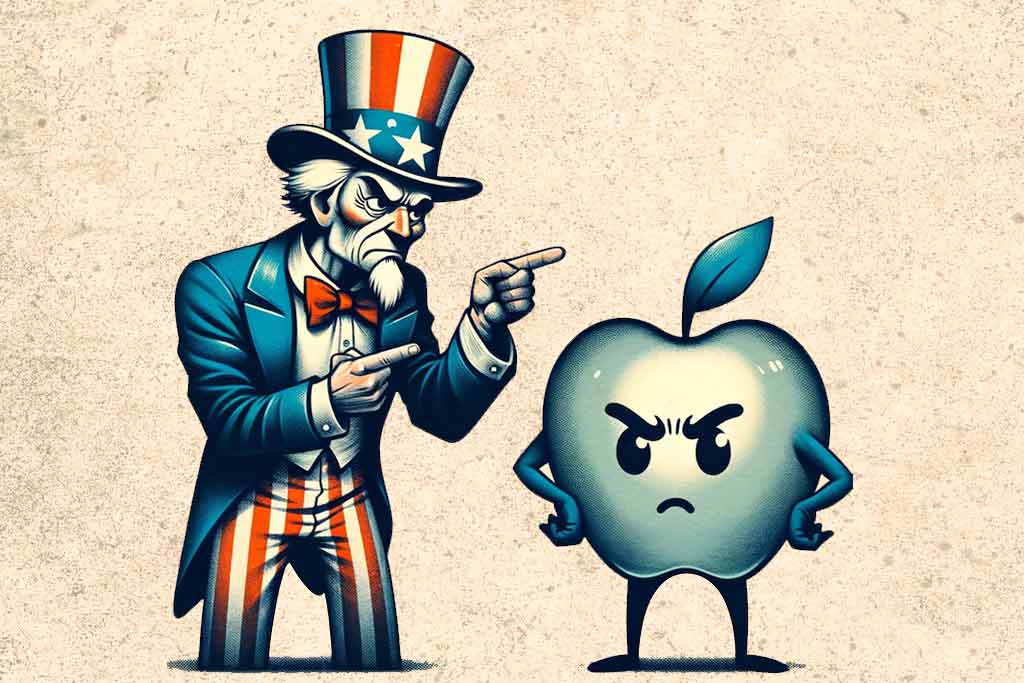The U.S. Department of Justice (DOJ) announced a landmark antitrust lawsuit against Apple Inc., marking a significant development in regulatory scrutiny of one of the world’s largest technology companies. This legal action comes after years of investigation into the iPhone maker’s business practices, with antitrust enforcers focusing on allegations that the company has implemented software and hardware limitations on its iPhones and iPads. These limitations are said to impede rivals and app developers from effectively competing in the market.
The long-anticipated lawsuit was filed in federal court in New Jersey, and claims Apple’s antitrust infringements go beyond the iPhone and Apple Watch. They extend into Apple advertising, the iOS App Store, Facetime, Apple Pay, and Apple News. The company argues that there has been no credible evidence of consumer harm, and complying with all of these regulations costs them money and makes it more difficult to offer new products and services to their customers. However, U.S. Attorney General Merrick Garland said, “If left unchallenged, Apple will only continue to strengthen its smartphone monopoly.” Apple shares fell over 3% during early trading on Thursday and continue to decline following the antitrust suit.
The DOJ’s concerns mirror grievances aired by various companies and developers, including high-profile disputes with Epic Games over App Store policies. Specifically, Apple’s App Store, which levies a commission of 15% to 30% on transactions, has been a central point of contention. Apple has made some concessions, such as allowing U.S. developers to use alternative payment systems, albeit with a significant commission. Despite these adjustments, critics argue that the changes are insufficient and continue to disadvantage developers and competitors.
In a notable move, Apple representatives met with the Assistant Attorney General in what is described as a last-ditch effort to avoid litigation. Such meetings often precede the filing of a lawsuit, indicating that both sides have explored their positions thoroughly but have not reached a resolution that would prevent legal action.
Moreover, this lawsuit is not isolated in its scrutiny of Apple’s practices. The company faces similar challenges globally, with recent developments in the European Union necessitating changes to how Apple operates its App Store and other services in compliance with new digital gatekeeper rules. Additionally, Apple is expected to face a significant fine from the EU’s antitrust watchdog related to its practices concerning music-streaming rivals on its platform.
The DOJ lawsuit against Apple underscores a broader push by U.S. and international regulators to address the market power and business practices of big tech companies. This case, along with others like it, could have far-reaching implications for how tech giants operate and compete globally.
DOJ & Big Tech Antitrust Case History
This isn’t the first case the federal government has dropped on technology giants for antitrust violations. Here are some notable examples of other cases:
- United States vs. Microsoft Corp. (1998): This landmark case accused Microsoft of holding a monopoly in PC operating systems. It focused on the company’s practices around its Internet Explorer browser and its integration into the Windows operating system. The outcome was a settlement that imposed restrictions on Microsoft’s business practices.
- United States vs. Google LLC (2020): The DOJ filed a lawsuit against Google for anticompetitive practices in the search and search advertising markets. The lawsuit alleged that Google maintained monopolies through anticompetitive and exclusionary practices, including entering into exclusive agreements that limit competitors’ access to vital distribution channels.
- United States vs. Visa and Plaid (2020): Although not a tech company per se, Visa’s acquisition of Plaid, a fintech company, drew scrutiny for potential anticompetitive effects in the financial services market. The DOJ filed a lawsuit to block the acquisition, arguing it would eliminate a nascent competitive threat to Visa in online debit transactions. The merger was eventually called off in 2021.
- United States vs. AT&T and Time Warner (2018): The DOJ attempted to block the merger of AT&T and Time Warner, arguing it would harm competition and lead to higher prices for consumers. Although not exclusively a tech case, the merger had significant implications for digital content distribution. The court ultimately ruled in favor of the merger.
Investigations and Potential Actions: Besides filed lawsuits, the DOJ has been involved in various investigations and considerations of actions against other tech giants for potential antitrust violations. This includes scrutiny over Amazon, Apple, and Facebook (now Meta) for different practices that might stifle competition within their respective domains.


